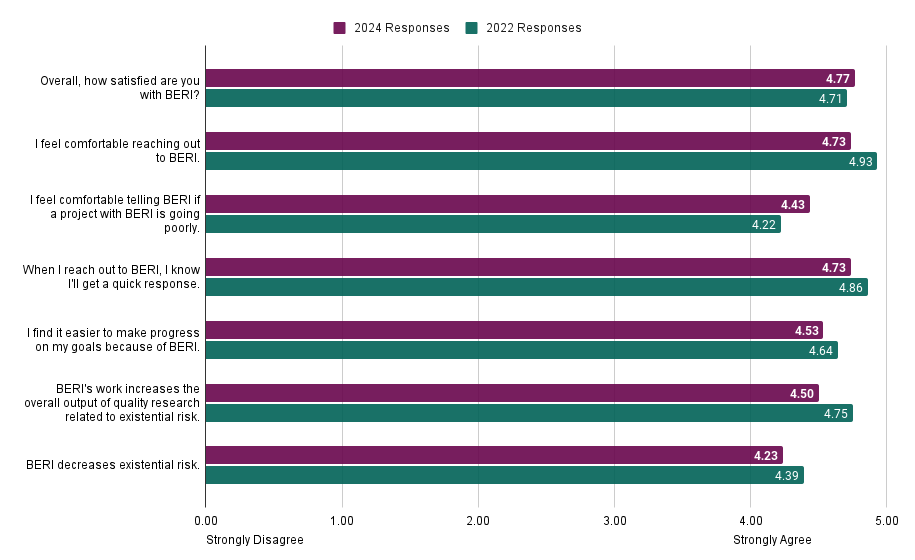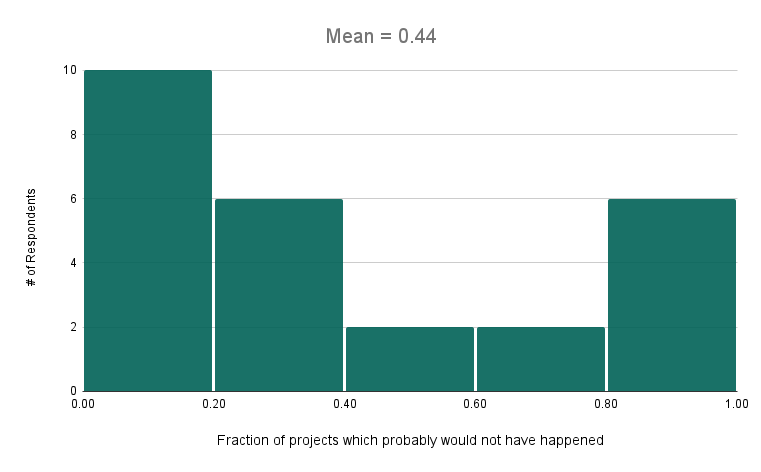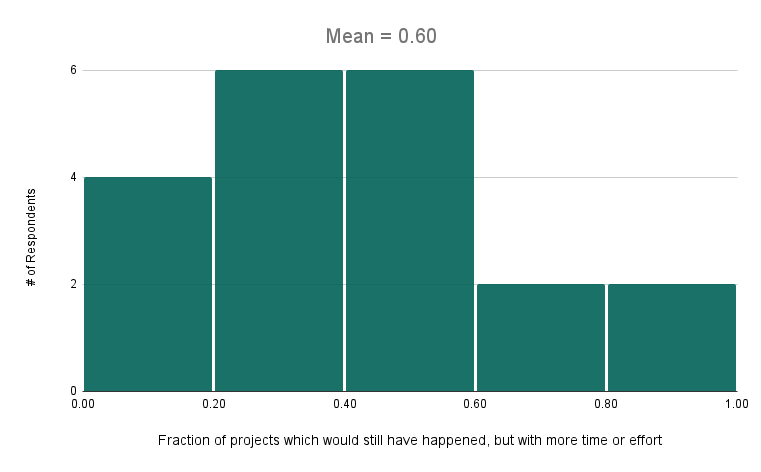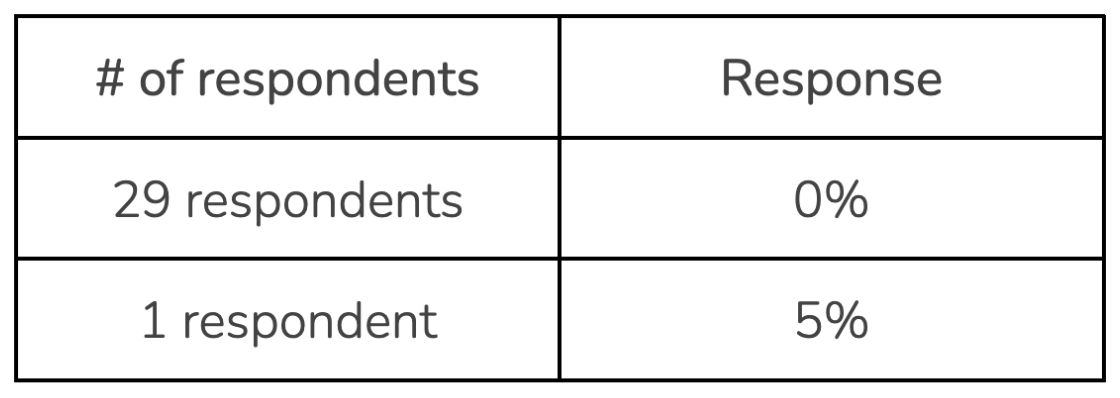2024 Collaborator Survey Results
In January 2024 we sent a survey to 70 of our collaborators, attempting to measure their opinions of BERI. The survey was based off the previous collaborator survey sent in 2022. No questions were omitted from this year’s verision, but several new questions were added.
Who responded to the survey?
We sent the survey to 70 individuals, including at least one person from each of our main university collaborations and key individuals at more established trial collaborations. We biased our selection of recipients towards those we’ve helped recently (in 2023), but also included some individuals who had particularly involved relationships with BERI prior to 2023.
Like our last survey in 2022, this survey was anonymous. There were 30 responses, all of which were submitted in January and February of 2024.
For more information on BERI, please refer to our website or email contact@existence.org.
Quantitative feedback

Additionally, 2024 respondents report that:1
- 44% of projects which received BERI’s help would not have happened otherwise.
- This is higher than the 35% reported in 2022
- 60% of projects which received BERI’s help would still have happened otherwise, but more slowly or in a way that would have taken more of their time or effort.
- This is slightly higher than the 54% reported in 2022
- 1% of projects which received BERI’s help were made slower or more difficult by BERI’s involvement.2
- This is the same as was reported in 2022
Qualitative Feeback
In order to keep comments anonymous, we’ve removed sentences and censored phrases that included identifying information. We’ve also made minor grammatical corrections.
What do you like about BERI?
- BERI is easy to work with and has provided very useful support in a variety of ways.
- Quick and clear answers, open communication. I could trust BERI to do the right things.
- In general, BERI’s quick resourcing amplifies and speeds our impact. Among qualities, my favorite is that BERI staff speak plainly and act on their words. Among resources, my favorite is resourcing minimal procedural delay - enabling in days (or hours) what would cost weeks or months to shepherd through University processes.
- Makes it very easy to buy things compared to [university] purchasing
- Fast and flexible way to do things university bureaucracy is bad at
- Sawyer is friendly, pragmatic, communicates clearly, just overall great.
- So responsive, genuine problem solvers, feels like they genuinely are invested in our group and want us to succeed
- Things are easy.
- They focus on asking what we need in order to carry out our research. Too many times the academic grant process and the way universities focus on research income encourages researchers to ask for as much funding as they think they can get regardless of what is needed, or alternatively we have to dramatically change the direction of our research to fit the focus of the funding scheme, which almost always results in weak research outcomes.
- Very responsive. Very transparent wrt decision-making. Very positive/upbeat.
- Super fast turnaround times. No bureaucratic headache.
- Its mission
- BERI staff extremely approachable and constructive
- Really on top of everything, never have to worry about a dropped thread
What do you dislike about BERI?
- I worry we build [our group] dependent on / accustomed to BERI resource support…which, should BERI lose funding, would disappear. A solution to that might be to designate as “endowment” a portion of BERI’s funding for evergreen or long-wind-down staff.
- Nothing really, as a BERI-supported researcher it’s all upside
- I’m not quite sure what their scope or funding situation is, or what kinds of work they want to help with.
- Wish they had partner offices abroad to further expand global impact (this is probably a relatively unique issue for our group tho)
- Nothing
- Nothing so far.
- It should be in the UK
- Too small - could be bigger!
What is one thing that BERI doesn’t currently do, but that you wish we did?
- I did not know of the existence of BERI until a colleague pointed me to it. Might be useful for you to also advertise your existence a bit more, so people know what options are out there (or I might have just been in a bubble)
- Wild idea: a central “comms” / PR resource that could fractionally help BERI-supported orgs with communications. This would seem to make sense as we get a river of press inquiries, and the positioning of [our lab] as well as other BERI-supported orgs could be somehow clarified and coordinated by a single comms resource. When (e.g.) the BBC wants a view on LLM impacts on LAWS, comms could (1) assure consistent messaging, and (2) suggest other BERI-supported orgs’ possible interviewees.
- One thought that came to mind (didn’t have it before this question) is maybe doing some training on best practices for organization management? Many of us are starting orgs for the first time and are learning on the fly. If there are best practices we can learn to scale up quickly in this area it might make all of our orgs more efficient!
- Am planning a May global meeting on AI safety, perhaps could act as admin hub for that
- I don’t know exactly all the things BERI does. In my case, it’s quite flexible.
- Perhaps keep/share high-level documentation on different collaborations. As someone who was hired into an existing collaboration, it would have been useful to have a doc called something like ‘BERI + ‘my org name’: overview’. This might have included info on what ways BERI had supported us in the past, how much funding BERI had earmarked for the org, and what constraints there are on the use of those funds.
- Fund PhDs
Appendix


